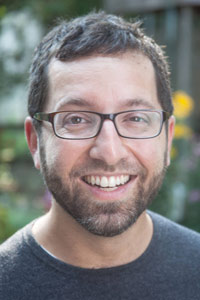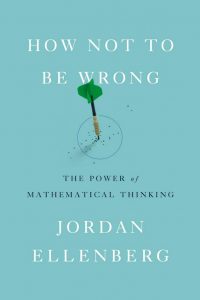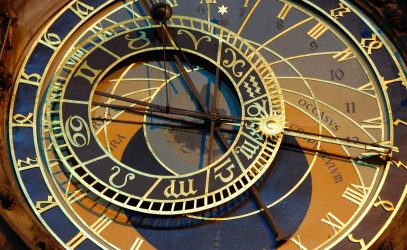Jordan Ellenberg is a Discovery Fellow in WID’s Optimization research group and a professor of mathematics, whose recently published book How Not To Be Wrong illuminates the importance of mathematics in our everyday lives. He has contributed to The New York Times, The Washington Post, The Wall Street Journal, The Boston Globe, Wired and The Believer and writes the “Do The Math” column in Slate. WID discussed all things math with Ellenberg over coffee.
Interview conducted and edited by Mary Sussman
What is it about math that inspired this book and your life’s profession?

I thought it was time to do something that shows that although mathematics sometimes seems abstract and far away from everyday life — just a big game that we play on paper in school — it’s actually tightly interwoven with the decisions people make and the kind of reasoning that people do every day. I wanted to shine a light on that. Being a math professor — well, it’s a great gig. It’s always the No. 1 “best-rated” job in the country, if you believe those lists. But that’s not the real reason. When I was a child, my parents were statisticians and there was a lot of math in the house. So for me that was always plan A — to do math — because that was always the main thing that I did. I also wanted to be a writer. Writing the book allowed me to combine those two things.
Could you give an example of how math helps us understand everyday life?
For example, if you ask people whether they think government should cut its spending, the large majority of people say “yes.” If you then give them a list of possible spending cuts, the majority of people say we shouldn’t cut spending in the same category. They say we should cut in one certain category, but the majority do not agree on what category should be cut. So it looks like the majority of people do not want spending cuts even though they say they do. I think people interpret that as meaning that people basically are not thinking carefully or just are completely irrational. Whereas if you are willing to draw a few pictures, you can see that there is a perfectly logical rationale that would give those results. A mathematical principle that’s been understood and that’s been thought about for a long time — since the time of the French Revolution — is at work here. If you take rational decision-making and you multiply it by some large number and try to do it over a whole population, the aggregate results can look very irrational. The misguided conclusion that voters must be very dumb or not thinking very clearly or are irrational occurs precisely because people haven’t thought about the mathematical situation.
Do you think math can save the planet?
In terms of the planet, without some seriously hardcore math, you have no understanding of what’s going on with the climate. I think it’s absolutely essential for climate change work — the practitioners of this kind of science are very good at this — to constantly question your assumptions, constantly press on the boundaries of the model and constantly ask how confident are you that the prediction is correct versus just an extreme. What is the set of possible outcomes? These are all fundamentally mathematical questions when you try to predict what a physical system like the atmosphere is going to do.
“It’s almost impossible to imagine anything like our human universe without people thinking mathematically. There’s no human life without math. It’s sort of baked into the way we think.”
— Jordan Ellenberg
What would happen if we didn’t have math as a discipline?
What if we didn’t have singing or sex? It’s a basic part of the human condition to have math. We’ve always had it as long as we’ve had civilization. It’s almost impossible to imagine anything like our human universe without people thinking mathematically. There’s no human life without math. It’s sort of baked into the way we think.
Math is a discipline with its own language. It’s a system. It’s a tool. What is it really?
I don’t think there really is a sharp dividing line between what is math, and what is not. That’s one of the themes I explore in the book. You probably do a lot of math already in your daily life as you think about things and make decisions, conjectures and guesses about what’s going to happen in the future, without calling it math. There is a language mathematicians use to speak to one other. It’s very useful, but this language has the sort of perverse effect of making other people feel that we are talking about some completely different thing that is not in their life.
Do you think math has any limitations?
Math is one mental toolkit, but our brains are very big places, and we have lots of mental toolkits. Many problems are not all mathematical. There are super-interesting ways that you can talk about human behavior mathematically, but there are also super-interesting ways you can talk about humans, and what they do non-mathematically. It’s what novelists do and what psychologists and poets and singers do. My argument is that you should fire on all cylinders. You should not cut off the mathematical side. Sometimes, I think people literally oppose the mathematical to the human. They say, “I want to study this from a human point of view or from a humanistic point of view or a creative point of view, not a mathematical, or rigid or arithmetical point of view.” Mathematics is a deeply human enterprise. It is a deeply creative enterprise.
Can math answer theological questions?
When people look at the world and see how rich and complex it is, they ask how could that have arisen by chance? How likely is it that there is not some prime mover behind it all? That is a mathematical argument although there are no equations or numbers in it. To assess if that argument makes sense, you have no choice but to bring the tools of mathematics to bear. One reason I wrote the book is to argue that you should leave math out of it if you’re deciding to be religious or not. I write about Blaise Pascal, a great mathematician who was also deeply religious. Because he understood math, I think that he very clearly understood that mathematics did not have the answers to the question of religious belief. He found it frustrating. You have to believe or not believe. Yet, math doesn’t tell you whether you’re supposed to believe.

Are there dangers if people don’t do the math or perhaps if they’re incapable of doing the math?
Any powerful tool is dangerous. Cars and guns are dangerous. Math can be dangerous too — and like cars and guns — is especially dangerous in the hands of people who don’t really know how to use the tool. Math carries an enormous cultural prestige. But people can use math to intimidate and say things like, “You simply haven’t understood the math, so you can’t argue with what I’m saying.” I think that’s problematic. I think if people are more acquainted with the basic tools, it would be harder to intimidate and bully them.
Who are your favorite mathematicians?
I have a few, including Pascal and Marquis de Condorcet whom I write about in my book. I started the book with an anecdote about a somewhat less famous mathematician named Abraham Wald, who worked in this top-secret math lab in a dingy New York City apartment during World War II. He was part of a research group that helped the Army analyze military data. The Army wanted to know which parts of the planes needed strengthening. He used his training as a statistician to analyze statistics concerning the location of flak and bullet holes on bombers that returned successfully from their missions. Statistics indicating that planes sustained heavy damage in certain sections yet returned safely from their missions led him to conclude that areas of the planes that showed little or the least damage statistically were likely to have been the weakest areas of the plane that needed reinforcement.
Do you ever get confused doing math?
When you are a mathematician, you spend a lot of time being confused, and it’s very productive. If you’re not confused, it means you’re not thinking about hard enough problems.


You must be logged in to post a comment.